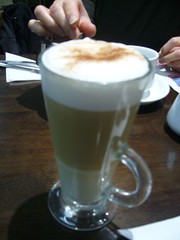If Your ICT Provision Were a Restaurant...
 Presentation is important tooA lot of restaurants provide free 'extras' that help to make the experience enjoyable. So, as an interesting little exercise, if you're an ICT co-ordinator or ICT subject leader, what do you do to make people's experience of ICT more pleasant?
Presentation is important tooA lot of restaurants provide free 'extras' that help to make the experience enjoyable. So, as an interesting little exercise, if you're an ICT co-ordinator or ICT subject leader, what do you do to make people's experience of ICT more pleasant?
The kind of things restaurants do, depending on the type of cuisine, and the individuality of the owner, include:
- Placing fresh iced water on the table without your having to ask for it.
- Placing bread on the table.
- Placing bread sticks on the table.
- Putting a plate of olives on the table.
- Supplying you with 'bottomless' coffee.
- Supplying you with 'bottomless' fresh orange juice.
- Giving you a square of chocolate when the bill is presented (as a sweetener?).
- Giving you a complementary drink along with your bill.
- Opening the door for you as you leave.
- Shaking hands with you as you leave.
- Presenting ladies with a rose.
What do all of these have in common?
- They are 'extras'. One could argue that good food and service are to be expected and therefore, in a sense, need not be commented upon. However, extras are, by definition, things you were not expecting, and therefore nice to receive.
- They do not involve huge effort or cost on the part of staff.
- They are the kinds of thing that are most likely to generate word-of-mouth recommendations.
So, if you were to adopt this philosophy, what kind of 'extras' might you provide to other teachers wanting to make use of the educational technology facilities? Remember, this could be quite important in encouraging reluctant teachers to use the technology in the future. Here are a few of my suggestions.My philosophy is that someone ought to be able to use the facilities from scratch, and walk out with a print-out of their work five minutes later. Therefore, these first suggestions are all geared towards that (although that is not the only consideration).
- There should be guest log-ins available, with the details on a card that is attached to the computer or laptop.
- Printing should be easy: no need to have to think about which printer to use, for instance, unless the choice is blindingly simple, eg between monochrome and colour.
- Instructions should be available -- on the walls, on the desks, perhaps even on the computer itself.
- Assistance should be available if needed, perhaps from a classroom assistant or a technician.
I also believe that your working environment should be pleasant and welcoming, so I should recommend one or more of the following:
- Get rid of all those notices telling people what they can't do. It just creates a depressing, negative atmosphere.
- Make sure the keyboards are clean. When I use the tech facilities in a school, I don't expect to have to use an alcohol-based hand wash afterwards.
- Make sure the monitors are dust-free, as far as they can be. Why should people have to risk eye or skin irritation?
- Make sure the environment is clean and pleasant. When I work at home I am not surrounded by screwed up print-outs on my desk and floor, so why should I have to be in that environment in a school?
You might say that these things aren't your job, and I'd agree. But I'd argue that it is your job to make sure they get done. Your role may be that of a 'technology evangelist', working alongside teachers and encouraging them to use the technology rather than having a direct part to play in the provision of such facilities. Even so, your job is going to be that much harder to do if the physical environment is deeply unpleasant.Incidentally, in case this post seems predicated on the existence of a computer lab, pretty much the same arguments apply in other circumstances. If, for example, you have banks of laptops and no computer room at all, you would still want to make sure that, for example:
- The laptops are clean.
- They are fully charged.
- They come with instructions for using the laptop itself, including log-in details...
- ... and instructions for using common programs like the word processor on your system.
- A number to call if assistance is needed.
Of course, none of these are 'extras' as such. So extras might include, say:
- A private area where staff can work at computers without having to worry about students looking over their shoulder.
- Providing staff with the most up-to-date and/or advanced facilities.
- Making tea, coffee and biscuits available.
- Having USB sticks to give to staff on which to save their work, security considerations permitting.
If none of these appeal, perhaps the 'extra' is simply a pleasant and friendly attitude. If staff feel that they are in a sharing, collegiate environment, rather than invading someone's private domain, they are much more likely to return.
For more ideas, read the series called 31 Days to Become a Better Ed Tech Leader.
An earlier version of this article was originally published on 15 September 2009.